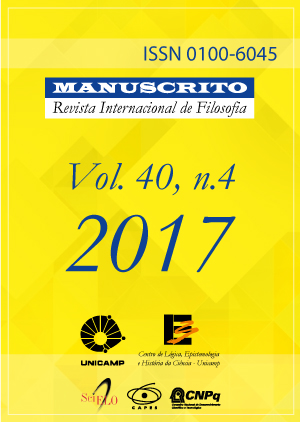Resumo
This essay presents the chief reasons for making a distinction between propositional and doxastic justification and, also, points out two things: (1) no theory of propositional justification implies a theory of doxastic justification; (2) infinitism is, essentially, a theory of propositional justification. Additionally, this paper tries to shed some light on the three conjointly sufficient conditions for a proper infinitist view of propositional justification.Referências
AIKIN, S. Epistemology and the Regress Problem, NY: Routledge, 2011.
ALSTON, W. Epistemic Justification, Cornell University Press, 1989.
AUDI, R. Epistemology: A Contemporary Introduction to the Theory of Knowledge. NY, Routledge, 1998.
AUDI, R. Rational Belief: Structure, Grounds and Intellectual Virtues. Oxford: Oxford University Press, 2015.
BERGMAN, M. “Is Klein an Infinitist About Doxastic Justification”.Philosophical Studies 134 (1):19-24 (2007)
CLING, A. “The Trouble With Infinitism”, Synthese, Volume 138, 1 p. 101–123, 2004.
FANTL, J. “Infinitism and Practical Conditions on Justification”, Logos and Episteme 2 (2):191-209, 2011
FIRTH, R. “Are Epistemic Concepts Reducible to Ethical Concepts?” in Goldman, A. & Kim, J. (Eds.), Value and Morals. Doordrecht: D. Reidel Publishing Co., 1978.
FLORES, T. “Infinitism and Inferential Externalism”, Veritas, v. 60, n. 3, 2015.
GOLDMAN, A. Liasons: Philosophy meets the Cognitive and Social Sciences. Mass. MIT Press, 2003.
FOGELIN, R. Pyrrhonian Reflections on Knowledge and Justification. Oxford: Oxford University Press, 1994.
INUSAH, H. “Infinitism and Dispositional Beliefs”. E-Logos, v. 21, 1, 2014.
JOHNSON, R. “Internal Reasons and the Conditional Fallacy” The Philosophical Quarterly 49 (194): 53-72, 1999.
KLEIN, P. “Reasons, Reasoning, and Knowledge: A Proposed Rapprochement between Infinitism and Foundationalism”, In Turri, John and Klein, Peter. (eds) Ad Infinitum: New Essays On Epistemological Infinitism. Oxford: Oxford University Press, 2014.
KLEIN, P. “Infinitism and the Epistemic Regress Problem” In Tolksdorf Stephan (ed.), Conceptions of Knowledge. de Gruyter, 2011.
KLEIN, P. “Human Knowledge and the Infinite Progress of Reasoning.” Philosophical Studies 134: 1–17, 2007.
KLEIN, P. “Infinitism is the solution to the regress problem”. In Steup, M. & Ernest, E (Eds.), Contemporary debates in epistemology. Malden, MA: Blackwell, 2005.
LEHRER, K. Knowledge. Oxford: Clarendon Press, 1974.
LEITE, A. “On justifying and Being Justified” Philosophical Issues, 14, Epistemology, 2004.
POLLOCK, J. and CRUZ, T. Contemporary Theories of Knowledge, 2nd ed. New York: Rowman & Littlefield, 1999.
SCHROEDER, M “What Makes Reasons Sufficient?” American Philosophical Quarterly 52 (2):159-170, 2015.
SHOPE, R. “The conditional Fallacy in the Contemporary Philosophy” Journal of Philosophy 75 (8): 397-413, 1978.
STEUP, M. & ERNEST, E. (Eds.), Contemporary debates in epistemology. Malden, MA: Blackwell, 2005.
TURRI, J. and KLEIN, P. (eds) Ad Infinitum: New Essays On Epistemological Infinitism. Oxford: Oxford University Press, 2014.
TURRI, J. “On the Relationship Between Propositional and Doxastic Justification” Philosophy and Phenomenological Research 80 (2):312-326 (2010)
WILLIAMS, M. “Avoiding the Regress” In Turri, John and Klein, Peter. (eds) Ad Infinitum: New Essays On Epistemological Infinitism. Oxford: Oxford University Press, 2014.

